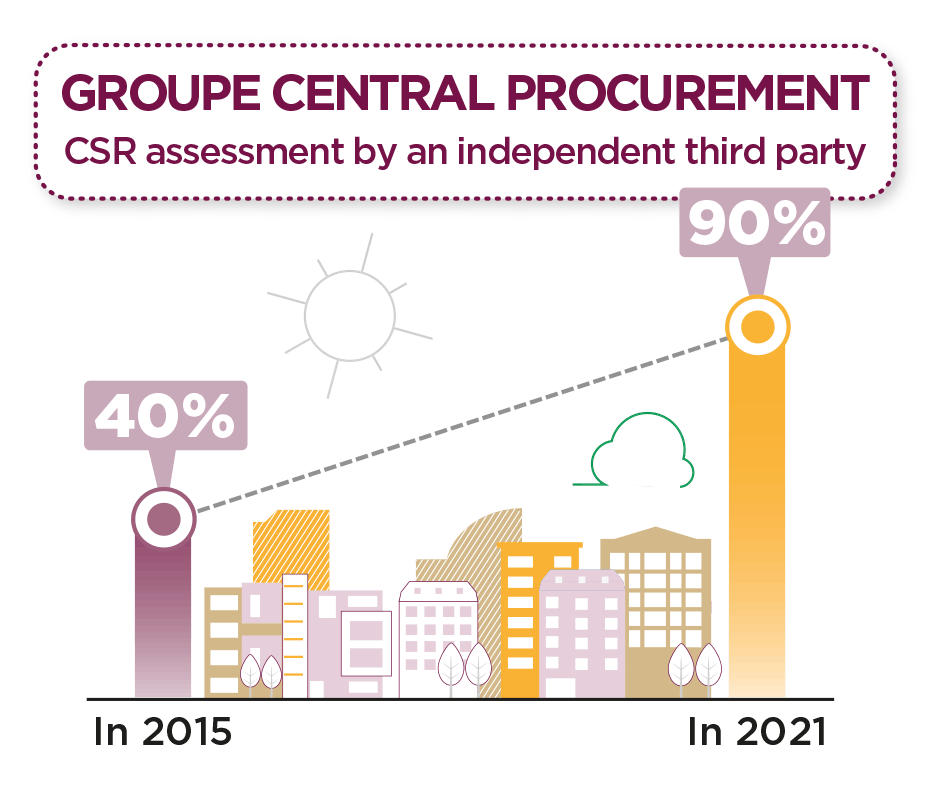- security of IT systems: Groupe Security Office (GSO) teams conduct a technical review combined with tests (due diligence) on the security of suppliers’ systems in order to verify their compliance and their security. They validate the service continuity plans proposed by suppliers;
- CSR, social and environmental impacts: the CSR component is addressed either by external assessments for the Groupe’s strategic suppliers, or for critical suppliers, by a CSR self-assessment on the Groupe’s P.A.S.S (Publicis Groupe Providers’ Platform for a self-Assessment for a Sustainable Supply-chain) platform. The CSR assessments count for 20% of the final score awarded to the supplier’s proposal.
Two dimensions are treated in specific ways: suppliers’ diversity, in order to better identify them and work with a greater number of them, and the climate commitments that are subject to specific monitoring.

In terms of subcontracting, the agencies endeavor to anticipate as best they can their clients’ major constraints, notably concerning the time needed to carry out certain projects during peak activity periods. In all countries, the Groupe ensures that all suppliers are treated fairly and paid promptly. All employees negotiating with suppliers must respect the rules of the Janus Code of Ethics and act in a professional and rigorous manner, free from any conflicts of interest.
The policy CSR for Business Guidelines is explicit and demanding on the three aspects related to the application of the law on the duty of care: human rights and fundamental freedoms, health and safety of people, environmental impacts. This policy reflects the continuous work carried out between the Groupe’s Procurement CSR Departments, supported by regular training sessions on regulatory issues, market developments to be anticipated, the sharing of best practices and discussions on indicators. The Groupe’s Procurement team is based in the Groupe’s three main regions: Americas, Europe and APAC. The Groupe and agencies’ procurement policy is proactive in terms of eco-responsible, eco-designed products from the circular economy or that have been responsibly sourced or have a recognized environmental certification. This policy is subject to an annual review.
This CSR For Business Guidelines policy is included as an appendix to all calls for tenders and is part of the contractual clauses signed between Publicis Groupe and its suppliers. This document is publicly available in CSR Smart data and is communicated to suppliers when contracts are renewed. Non-compliance with any one of these 12 guidelines is a non-selection criterion.
For certain activities, such as security and cleaning, which are carried out by very small local businesses, the Groupe makes sure that it regularly assesses its local suppliers regarding their respect of human rights, and all social and societal criteria. In several countries, the Groupe has signed specific commitments, such as the Modern Slavery Act as in the United Kingdom or Australia; or has certifications such as the BBBEE – level 1 (Broad-Based Black Economic Empowerment) in South Africa, which requires specific local compliance on certain human rights issues such as the fight against human trafficking, or related to labor law such as the fight against all forms of discrimination.
4.2.7.2 CSR assessment
This is structured as follows:
- CSR assessment by an external third party (EcoVadis, Refinitiv, Sedex, CDP or others): this approach is the preferred approach. Since 2015, the Groupe Procurement Department has introduced a systematic CSR assessment for all its strategic suppliers. Publicis Groupe works with the EcoVadis platform and invites its strategic partners to be assessed by an external third party. In 2015, these assessments represented 40% of the volume of expenditures from strategic suppliers, reaching 90% in 2021; the objective is to cover 100% of the volume of central purchases by 2025. In 2021, Publicis Groupe had 250 suppliers assessed by Ecovadis (average score: 52/100);
